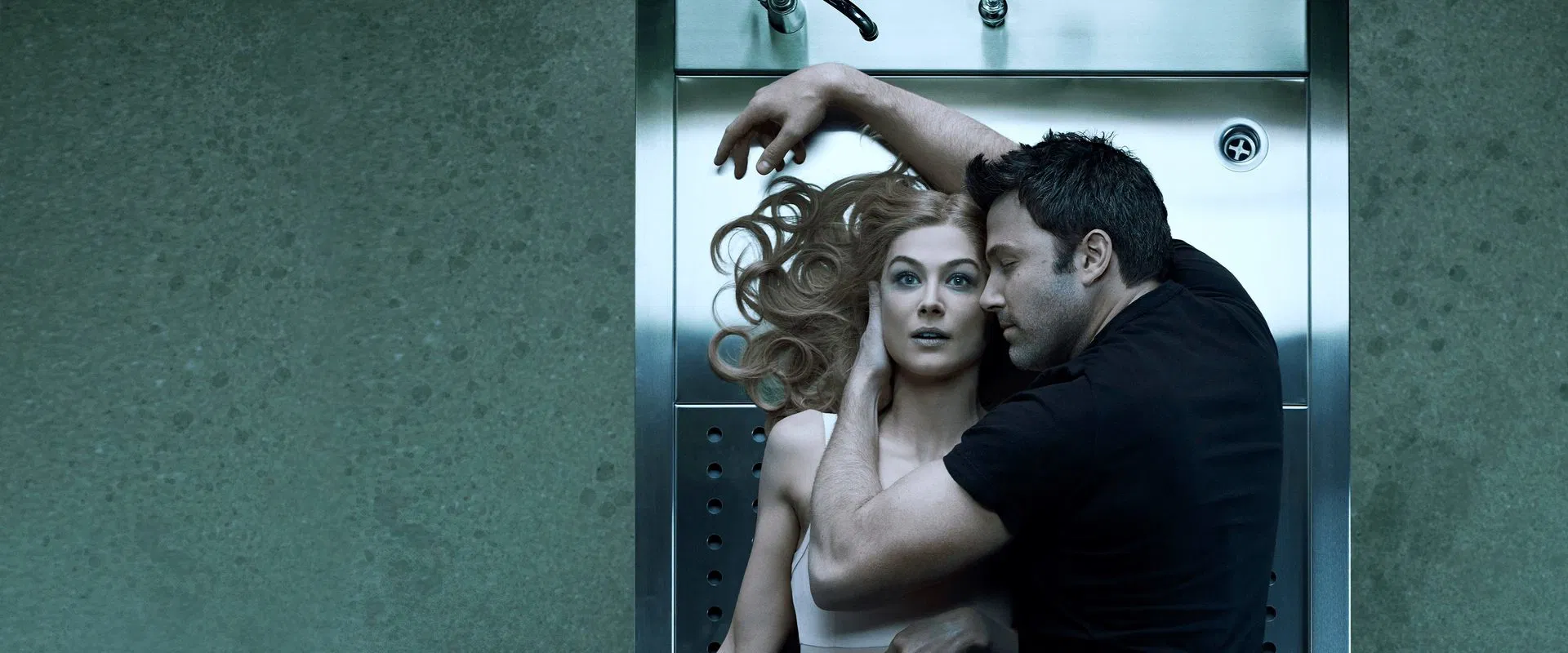Some films put you in a vice and tighten, click by click, until you’re not sure if you’re gasping from shock or from the giddy pleasure of being so expertly, so utterly manipulated. “Gone Girl,” that lurid psychothriller by David Fincher, wears its heart (if one can call it a heart: more like a bloodied, glinting knife) on its sleeve. This is the rare mainstream film that seduces us into collusion with its sociopath, pats our leg, and whispers, “Let me show you how deep the rabbit hole goes, don’t be squeamish, darling, it’s just your happily ever after with its throat slit.”
There’s a delicious perversion to Gillian Flynn adapting her own bestseller for the screen; the result is a movie that gnashes its teeth at the very idea of marital bliss. Fincher’s eye, so coldly erotic and cruelly exact, transforms the crumpled pleasantries of a Midwestern living room into a battlefield where love is the bludgeon and the wounds are always self-inflicted. What fascinates here is not the whodunit, although for two delirious hours, the movie scam and twists as only the best murder mysteries do, but the how-did-it-come-to-this: the slow, methodical evisceration of trust, innocence, reputation.
Rosamund Pike, as Amy, is a revelation, icy, radiant, and terrifying, the kind of muse who’d just as soon immolate herself as write a thank-you note. The first time she fixes us with that blankly considerate smile, you know you’re watching a performance that’s been chilled to perfection in the freezer aisles of Hitchcock and De Palma, then unwrapped and served raw. Very few actresses could pirouette between living perfection and monstrous self-awareness; Pike glides across this spectrum like an Olympic sociopath. Ben Affleck’s Nick is harder to love, in the way that a blank wall is hard to love, or a paper bag. But that, perversely, is precisely what’s required. Affleck’s gift here is to turn passivity into a kind of malevolent blankness, he’s a man whose face always seems to be waiting to be told what expression to wear, by his wife, his sister, or, more venomously, by us. It may be the finest performance ever given by a haunted J.Crew catalogue.
The miracle of the film is how Fincher and Flynn allow our allegiances to slither and slide, so that by the halfway point, when, in a lesser movie, the “big twist” would roll down the aisle in a dunce cap, here, it’s merely the end of Act One. If the camera is the traditional lens of truth, Fincher wields it like a TV anchor with a mean streak: he’ll turn a Midwestern kitchen into a scene of primordial guilt, shoot Affleck’s suspicious loafing as if the mere act of going home for lunch were a prelude to murder, and then stand back, smug, as the talking heads explain to us why we should hate whoever the plot requires next. You can sense Fincher’s glee as he lampoons the cable-news feeding frenzy (Missi Pyle is a cackling banshee of tabloid self-righteousness) and the cottage industry of instant verdicts and televised outrage that has made a joke of American justice.
Flynn’s script, with its nimbly fluttering timelines and prickly, dagger-sharp dialogue, is almost too elegant for this genre: it’s like watching an autopsy performed by a surgeon who enjoys their work a little too much. The duality in Fincher’s visual sensibility, the dreamily sunlit memories of early romance versus the sulfuric gloom of marital decomposition lays bare the rot beneath the glossy, wedding-magazine surface. Shot by shot, “Gone Girl” is a hymn to modern alienation: these aren’t just beautiful monsters, they’re monsters because they’re beautiful in ways they cannot bear.
There’s something gloriously ugly pulsing beneath the skin of the film: a portrait of American marriage as mutual hostage-taking, with divorce reduced to a polite form of homicide. Manipulation becomes not just Amy’s dark superpower, but the currency of every relationship, the media, voracious and sanctimonious, being just another partner in the danse macabre. In one of the film’s most potently cynical strokes, it’s only when Nick learns to work the cameras, to weaponize confession, that he has any hope of survival. (It helps, one suspects, to look this good in a mug shot.)
But let’s not ignore the supporting players: Neil Patrick Harris exudes a peculiar, perverse courtliness as the doomed Desi, a man so in love with his own pathetic chivalry that he never notices the guillotine poised above his bedpost. And Tyler Perry, radiating smooth wisdom as the crisis-management lawyer, nearly walks off with the film—his very breeziness is a joke at the expense of all the solemn talking heads who think crime is about clues, instead of TV ratings.
If the movie has a weakness, it’s perhaps that all this virtuosity becomes so chilly, so machine-tooled, that emotion is nearly asphyxiated: this is not a film that wrings tears, but one that draws blood. But that’s precisely its accomplishment: “Gone Girl” is a brilliant, grisly high-wire act, a gothic pageant operating with the efficiency and ruthlessness of a media circus, where there’s always a new atrocity to sell, a fresh victim for the grinder.
We’ve come a long way from the carnival worlds of Hitchcock and the journalistic swagger of Billy Wilder. “Gone Girl” might be the definitive movie of our clickbait century, the happiest ending is the one where nobody dies, but everybody is ruined. If Rosamund Pike doesn’t scare you off matrimony for life, you simply haven’t been paying attention.


